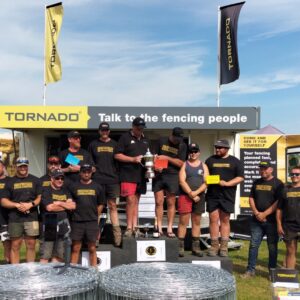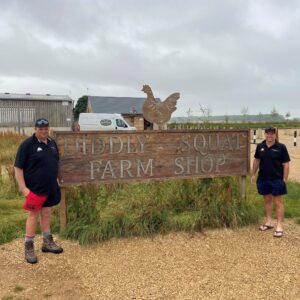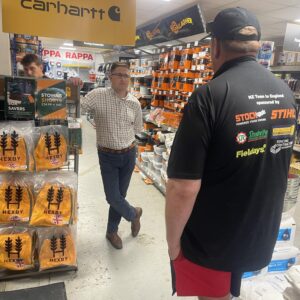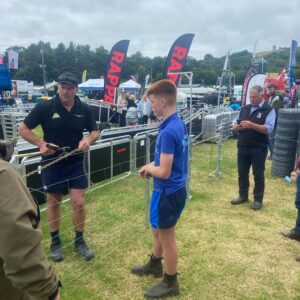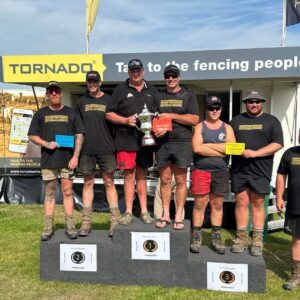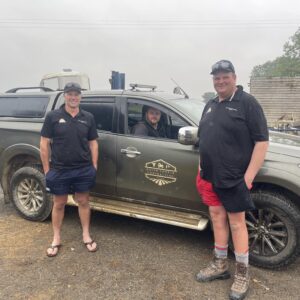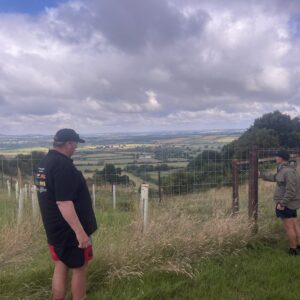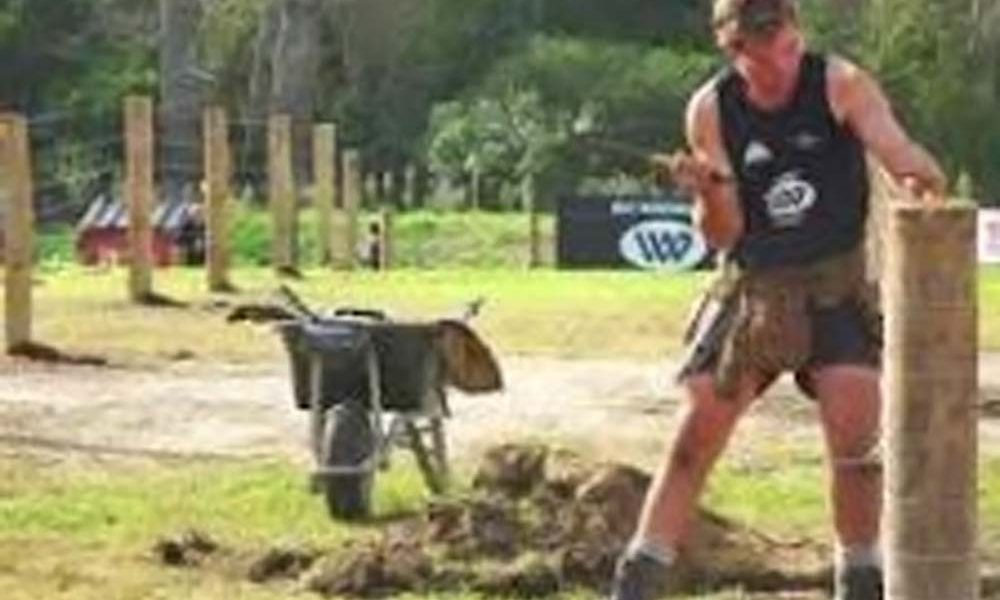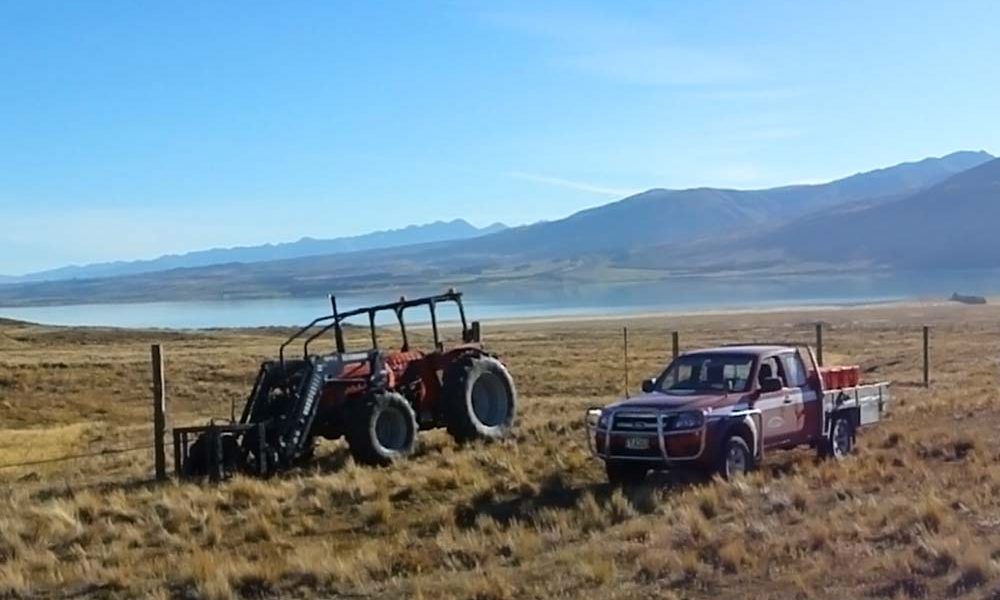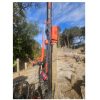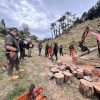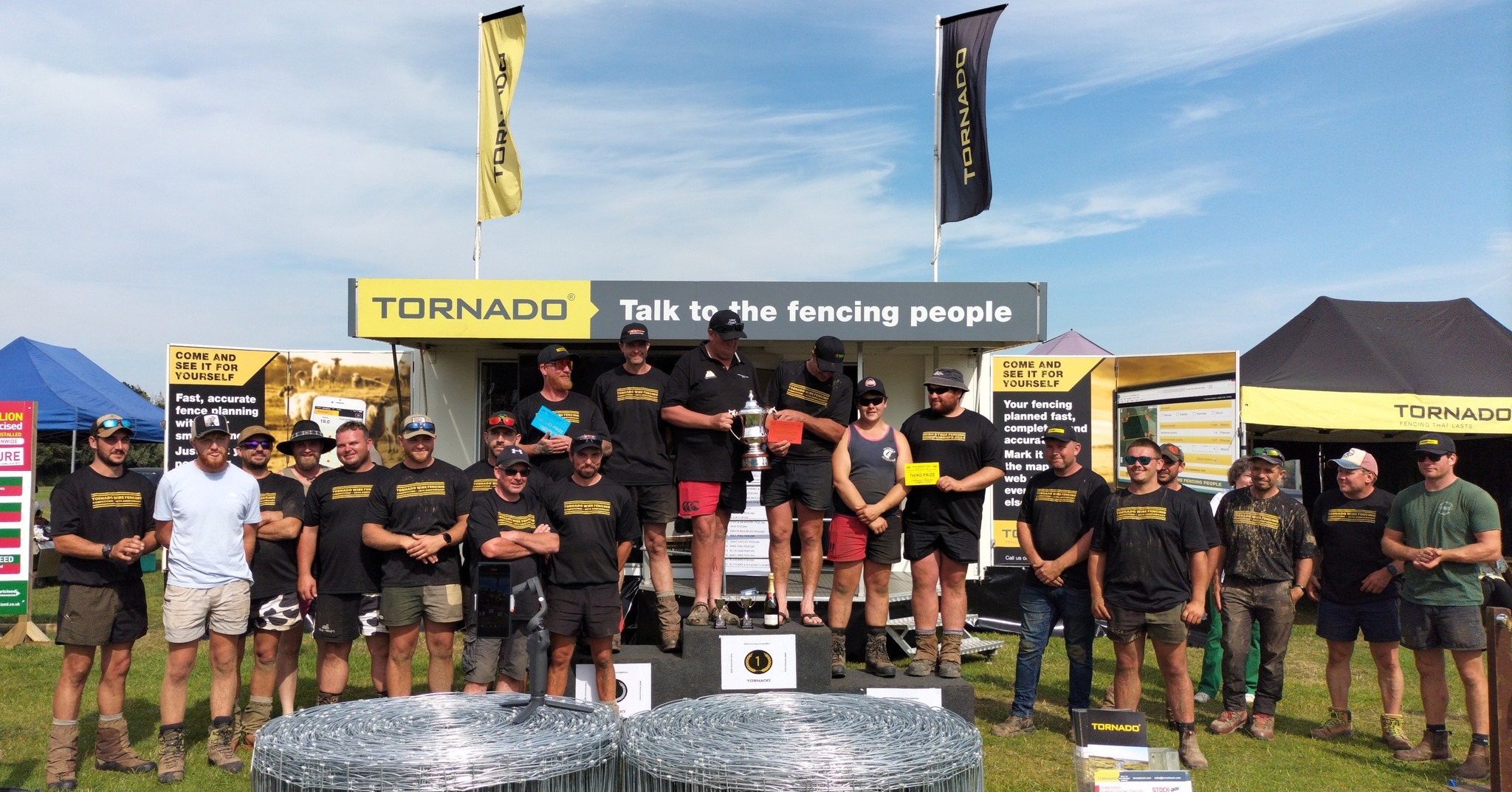
As winners of the 2023 Fieldays Silver Spades Doubles Championship, the prizes awarded to Mark Lambert and Jeff Joines included entry to the Tornado fencing competition, held in July in the UK. Mark Lambert shares his experience with WIRED.
The day after arriving at Heathrow Airport, having caught up on some sleep and adjusted to the time change, we met up with our first contractor, JC Countryside Fencing, run by James Corbett and his brother Tom.
We met at his yard, looked at some machinery and talked all things fencing. After a lunch meeting with James, his wife Ruth, and son Archie, we headed out to see some of James’s current projects and more of his machinery. We ‘helped’ with (i.e. watching) installing a strain of netting with James’ Protech 220b with Bushpig netter. Later, we were joined by another contractor for dinner at a local pub.
James kindly hosted us for the night, and the following day, we went for a drive, visiting the famous Diddly Squat Farm Shop, which unfortunately wasn’t open, but it was clearly a massive tourist attraction. We then visited a couple of suppliers with James and Tom, the first being Batsford Timber Ltd, where they had organised a tour of their yard and lunch.
Batsford Timber supplies all things fencing, from timber and posts through to tools and wire netting. We even saw some well-known Strainrite NZ tools in their showroom. The next stop was to Stoag. This would be best described as a Farmlands crossed with a hardware store – it stocked everything agricultural and more. It was great to see more NZ made products on shelves.
Leaving James, we made our way to meet Mark Evans at ProTech Machinery for an organised tour. There are some impressive tracked post drivers being made there, which are now seen across NZ. That night, we stayed with Mark, met his wife Clair and children Emily and William, and enjoyed a BBQ dinner with Nic Quan, his wife, and a couple more contractors.
The following day, we followed Mark Evans into Wales to attend the Royal Welsh Show. I would compare this to a big Fieldays/A&P Show, but with 80,000 people through the gates a day – it was an eye-opener. Everything agricultural; shearing comps, timber sports, stock showing, Young Farmers rugby games – it has it all and doesn’t slow down at night, being a big 4-day party.
At the show, we caught up with McVeigh Parker Farm and Fencing Suppliers, who are the Strainrite importers into the UK. Jeff did some wire tying demos and chatted with some locals.
From here, we travelled up the island, where we arrived at Millom, the home of Tornado Wire. We enjoyed a presentation of Tornado’s history, followed by a factory tour. Tornado supplies all things fencing and manufactures various nettings, barb wire and staples on site. The netting machines were from NZ, which showed just how big New Zealand is in the worldwide fencing industry. They distribute across the UK, Europe and into America.
One big thing we noted here was the factory’s location, being out on the West Coast. Anyone who has been to the UK will know once you’re off the motorways, some roads can be quite narrow, and either have hedgerows on each side, or stone walls, so there’s no room for error.
We travelled back to Cumbria, where we had dinner with Rob Bell from Rob Bell Fencing and his workers that evening.
The next day saw us out on the job with Rob, helping with (observing) a couple hundred meters of netting fence getting built. This was put up quickly and finished around lunch. Rob runs a SoloTrak post driver, which is transported behind a tractor and low-loader transporter. Once he moved the machine for his boys to carry on, we drove further up into the Lakes District, where we walked up into the hills to see a job he was about to start. The materials had been helicoptered into the fence lines as access was limited. The job would involve a lot of handwork and walking. Using bulldozers to level lines and make access better seems to be frowned upon over there.
We spent another night in Cumbria, then headed back to Mark Evans, where we would spend the next two nights. Mark had planned a couple of activities for us, including a morning spent at Giffin-Lloyd shooting ground where we shot clay birds with his son Will, through a series of traps set out across a farm. You pre-buy the number of clays onto a card, then drive around and stop at various stations, where you insert the card and shoot as many as you want from different traps. As a full sporting-type shoot, it was an awesome facility, hosting major UK shoots.
This was followed by a well-earned roast lunch at The New Inn, a black and white pub dating back to the 16th century, in a local village. We were joined by Mark’s wife Claire, daughter Emily, and a fellow contractor Jono Bradley, from J.A. Bradley Services.
Later that afternoon, we looked around Mark’s yard and equipment. We were joined by Nic and started going over gear and the competition fence; this led into the next day, where we proceeded to get on the tools and have a practice in the paddock. It was definitely no Mystery Creek – digging, and the use of a borer was very limited; the ground was a combination of dirt with good size stones. We then raided Mark and Nic’s tools and marked out a few key measurements on the levels.
That evening we travelled to Tewkesbury, and while checking into our hotel we met with a fellow competitor (who could spot a couple of Kiwis), and then joined Lewis Knox and Graham Turner from Scotland for dinner. Graham also is involved, and represents the UK, in timber sports.
The next day we left the hotel, bound for the Tornado Wire Fencing Competition at Three Counties Showgrounds in Malvern. This was the 40th year of competition, and we were lucky enough to be given a line and represent New Zealand as the winners of the 2023 Fieldays Silver Spades Doubles Competition.
It was great to arrive and have a pit crew made up of the MJ Evans fencing team lay all our gear out for us. We don’t get that in NZ! We arranged it a bit ourselves and talked through a bit of a plan, having seen the site. The strainer holes had been pre-drilled and then back filled. Looking at the stone in them and with the foreign tools we had been lent, it would be a bit different for us.
A quick briefing was held, we met a few of the other teams, and then the work began. The fence was approximately 50m long, had one angle about two thirds of the way along, and consisted of two diagonal stayed strainer assemblies with a tee foot, one plain wire at the bottom, an 8-wire Tornado netting, and two high tensile barbs above.
Even though the strainer holes had been pre-dug, it still took a lot of work to remove the fill. A good long-handle shovel couldn’t seem to be found in our shed-raiding of tools, but we got told “Use these” – a set of ‘spoons’ as they are known. They took Jeff a bit of getting used to.
Once the strainers and angles were set, we had the posts to put in. These were machined rounds, approximately 5.5 feet long, with points on them. We needed to drill a 50mm hole (some competitors bared their holes with a crowbar), followed by a drum of water to fill the hole, and then leave it to soak for a while as stays were done. We then used a sleeve hammer to install.
There was a bit of a misunderstanding of the fence specifications, and we managed to put in 12 posts instead of 9, which we only realised once we had finished the fence. The advice was to not worry about time and just work on quality, as time points aren’t worth much. Competing on a 33-degree day with dry, rocky ground conditions and foreign tools – we were not the first off the line by a long shot.
Judging then took place, made up of fencers and industry people from the UK and New Zealand’s Nick Liefting. Competitors were treated to a few refreshments and pig-on-the-spit for lunch, while rubbing shoulders with fencers from across the UK. While enjoying the rest of the show and looking at the fencing equipment, we caught up with expat Kiwi Simon Dale and his wife, who lives and builds the SoloTrak post driver.
Prizegiving then took place, announcing only the top three. We were lucky enough to secure the top step, with some very close scores. Second place went to John Morgan and Si Gibbs, and third was Duncan and Rory Samson. John and Si will travel out and compete next year at the 2025 Fieldays Silver Spades Doubles competition at Mystery Creek. After the competition, we moved to a paddock where we had a BBQ dinner and ‘chewed the fat’ with the guys that had stayed on.
With only a few days left, we started heading South, and decided to go and catch up with Marc Preston. Marc is a fencer and engineer who owns and manufactures the Bushpig brand of fencing tools and runs Somerset Fencing. We had a tour of his workshop and went for a drive to look at a big job he was on. These ground conditions were extremely hard, and the job was being done with all steel. He runs a big tractor and Fencequip post driver. We were treated to another pub lunch and then had a look at a big cider factory before departing ways.
We carried on further South and met James Hill down in Blandford, where we also met up with Nick and Ngaire Liefting. We had a sunset dinner at a hut up the back of the farm, overlooking the countryside, joined by another contractor, Nick Green and his family.
James has been a fencer for many years and has always had NZ made post drivers. He has now moved his focus to the retail market and owns a business called Wire and Wood. He sells everything fencing and has developed his own gauge of netting, which is slightly higher than usual and results in less barbed wire required. We spent two nights with James, visiting fencing contractor NJ Green’s set-up. We were treated to breakfast, put on by Nick’s wife. Then, onto a roundwood producer, where they recycle old creosote power poles into strainer posts. They also supply chestnut posts and rails – these are a sustainable tree and give character to the fence, due to the posts being split with a wedge and maul not sawn.
The success of this type of business in the UK is due to the type of timber treatment they are allowed to use. The UK still use imported pine posts, but they seldom last more than 15 years, according to several contractors we met. One of the most common posts used in the UK are creosote posts – they seem to last the best, but are a real safety hazard for the fencer installing them, causing burns on their skin while handling or cutting them.
We enjoyed another gathering at a local pub with everyone we had met that day and were treated to a nice meal.
Our last stop was in Hensfield, Sussex, with Tim Bennett. We met Tim at a roundwood producer and looked at their systems for producing chestnut posts. It was quite similar to the last yard but on a smaller scale. They make charcoal on-site with some of the offcuts. We drove up into the hills to seethe forest where the chestnut posts are harvested. There is a set season for this, and generally done in the winter months. We stopped and had a look at a chestnut pale style fence and an interlock rail fence also made from chestnut. This site also happened to be where the TV show The Repair Shop is filmed.
Tim put us up for the night, and we were joined for a BBQ dinner by family and fellow fencers.
On our last day in the UK, we looked at a couple of Tim’s jobs and his machinery. Tim runs tracked post drivers and one fitted with a Revolution 180, plus another three Revolution Post Drivers that he owns. After a coffee with Tim at a local café, we departed for Gatwick Airport, to get into our 40-odd hours of travel home.
We would like to thank all the people who supplied accommodation and meals, and took the time out of their days to keep us entertained. We met a lot of new people, and hopefully we will see some of them make their way to New Zealand so we can return the favour.
Lastly, we would like to thank the sponsors that made this trip possible: New Zealand Fencing Competitions, Revolution Post Drivers, Strainrite, Stihl, Stockade, Fieldays, and FCANZ.
Written by Mark Lambert
Published in WIRED issue 75/December 2024 by Fencing Contractors Association NZ
You may also like: Fieldays Fencing Competitions 2024
Read WIRED online
Follow us on Facebook
© Fencing Contractors Association NZ (FCANZ)

